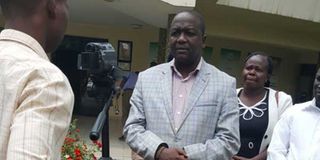Baringo leaders explore prospects of filing cases in Arusha-based African court

Baringo County Assembly Speaker William Kamket speaks to journalists at African Court on Human and Peoples' Rights in Arusha on September 20, 2016. He had a team from the county on a tour of the court. PHOTO | LUCAS BARASA | NATION MEDIA GROUP
What you need to know:
- Led by County Assembly Speaker William Kamket, the team explored possibilities of filing cases in the court.
- The Ogiek case was referred to the AfCHPR by the African Commission on Human and Peoples’ Rights in 2012.
- Kenya is among 30 countries that have ratified the protocol establishing AfCHPR.
- AfCHPR is a continental court established by African countries to ensure the protection of human rights in Africa.
A team from Baringo County on Tuesday visited the African Court on Human and Peoples’ Rights (AfCHPR) in Arusha to see how it works.
Led by the county assembly Speaker William Kamket, the team explored possibilities of filing cases in the court.
The AfCHPR and the Banjul-based African Commission on Human and Peoples’ Rights (ACHPR) started their fifth annual meeting in Arusha, Tanzania on Monday.
The meeting that ends Thursday is meant to “cement relationship of cooperation based on complementarity between the two institutions,” the President of the African Court, Mr Justice Sylvain Oré, said in a statement.
The two institutions will discuss progress on the establishment of the Legal Aid Fund, the creation of the Pan-African Human Rights Institute and 2016 celebrations to mark the African Year of Human Rights.
Last week, AfCHPR Vice-President Ben Kioko last week urged Kenya to allow them to receive cases from NGOs and individuals.
The Arusha-based court is currently handling a case in which the Ogiek have sued the Kenyan government for evicting them from their ancestral land in order to conserve the forest as a ’reserved water catchment zone’.
OGIEK CASE
The Ogiek argue that their eviction will have far-reaching consequences on their political, social and economic survival.
The case was referred to the AfCHPR by the African Commission on Human and Peoples’ Rights in 2012 as Kenya has not made the declaration to allow individuals and NGOs access it.
Only eight countries have made the declaration recognising the competence of the court to receive cases from NGOs and individuals.
However, Rwanda has asked to withdraw its declaration, a process that would take a year.
Kenya is among 30 countries that have ratified the protocol establishing AfCHPR.
AfCHPR is a continental court established by African countries to ensure the protection of human rights in Africa.
It complements and reinforces the functions of the ACHPR.
ACHPR was inaugurated in 1987 in Addis Ababa, Ethiopia.
The Commission’s secretariat has subsequently been located in Banjul, The Gambia.
The fourth joint meeting was held in Nairobi in July 2015.





